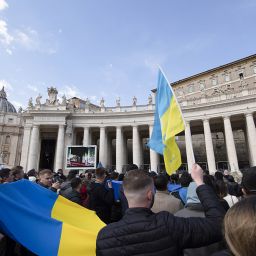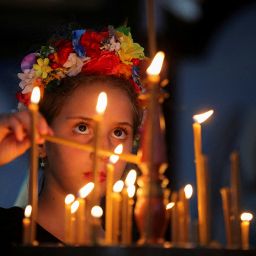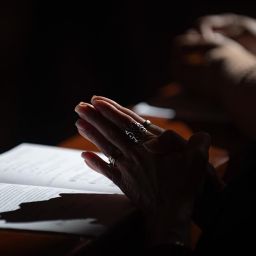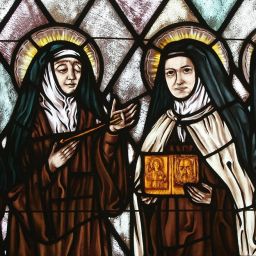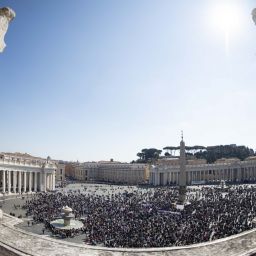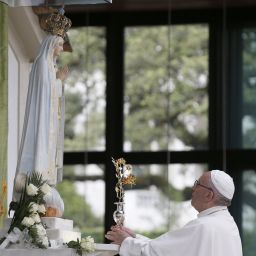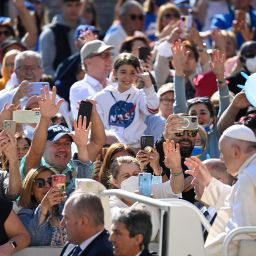By Father Jacob Dankasa
Special to The Texas Catholic
There is an adage in one of the Nigerian languages (Hausa) that says “Zumunci a kafa ta ke,” translated directly as “fellowship (or relationship) is on the foot.” This means that true fellowship is shown through physical presence. This adage reminds us of the need for demonstrating fellowship or relationship through physical visitation, which is even more important in today’s world, where physical presence is often replaced by media technology. In our busy world there is a tendency to neglect the need for physical visitation with family members and friends. Of course, COVID-19 is a setback to our physical presence at this time, but even without COVID our world and all its demands have, at least to some degree, forced many people into a life of individualism and separatism. Many of us explain why we are unable to be with family and friends with the simple excuse that we are too busy.
One set of mysteries of the holy rosary is the joyful mysteries. The second joyful mystery is a meditation on the visitation. Why is a simple act of visitation seen by the Church to be so important that it is named as a mystery?
Our Blessed Mother Mary, on hearing about the pregnancy of her older cousin Elizabeth, traveled “in haste” to visit her (Luke 1:39-56). Even though Mary was pregnant herself, she felt it was important to visit and serve Elizabeth, who had passed child-bearing age. The scripture tells us that Mary stayed with Elizabeth for about three months — helping her.
This simple act of visitation is important and meaningful because Mary, who had just found out that she would be the Mother of God, didn’t remain in her glory waiting for people to flock to her to congratulate her. Rather, regardless of her present glory she knew that someone else needed her presence — someone older, someone who probably had ceased to anticipate having a child in her life when she became pregnant. Mary was overjoyed on hearing the good news that Elizabeth was now with child. Knowing that Elizabeth was older, and of course weaker, Mary felt she would need help, and she ran in haste to visit Elizabeth — to be with her, to rejoice with her, and to help her. Unknown to Mary, her simple act of fellowship and solidarity and her desire to help an older relative became another source of glory for her. This scene of the visitation became a mystery of the rosary because the Mother of God, carrying the King of the World in her womb, brought even more joy to Elizabeth and her baby. The Emmanuel, God himself, was present in the home of Elizabeth. Elizabeth proclaimed that, even as the child in her womb leaped for joy. Mary didn’t bring herself alone to Elizabeth; she also brought the Son of God into the home of Zechariah and Elizabeth. The words spoken by Elizabeth presented Mary as a vessel, the Ark of the New Covenant, containing the Messiah. The visitation revealed Mary as the bearer of God — the Mother of God. This is a mystery.
Mary is a model of fellowship and relationship for us Christians — one who knew how to be present to loved ones, to bring joy into their lives. As humans we must not neglect this great practice of visitation. No matter what the world throws at us, we must remember that our presence with our loved ones and friends is very important. When we visit people, we bring a blessing of fellowship to them and strengthen our relationships. We must not be so busy that we ignore the need to be physically present to the people in our lives.
As a priest, I have the privilege of visiting nursing homes and assisted living centers to pray with and minister to the residents. What I hear from some of the residents brings tears to my eyes. There are many who express that their greatest pain is that it appears they have been abandoned by their families; they can’t remember when they last saw their son or daughter or had close relatives come to visit them. I know that the assisted living centers and nursing homes provide necessary help for many busy families who may not have sufficient time, or even the ability, to care for and nurse their sick or aging parents at home. But we must not be so busy that we forget that we sometimes need to be physically present to our parents and our loved ones. All those who take care of them in assisted living situations do the best they can, and many caretakers are very kind and caring, but they cannot replace the presence of a loved one, a family member.
Never ignore your parent wherever they may be. Calling them on the phone, FaceTiming with them, Skyping with them, and other forms of electronic communication are great — but they are not sufficient. Mobile technology is a blessing to our generation because it helps us to keep in touch with the people we love, but mobile technology cannot, and should not, replace our desire to be with our loved ones. We must cut out our business and go physically to visit them. Like our Blessed Mother, when we visit our loved ones who are incapacitated by disabilities, sickness or old age, or who simply need our help, we bring to them a blessing and a joy that no one who is paid to take care of them can provide. Fellowship and relationship should not be by phone calls, video, or text message alone. Effective fellowship and relationship should be truly demonstrated “with our feet,” with our presence. I pray that the COVID pandemic will soon leave us so that it doesn’t provide us with an eternal excuse not to visit, lest we lose the sense of presence for one another.
We must make a space for presence in our lives.
Father Jacob Dankasa is pastoral administrator of Holy Family of Nazareth Catholic Church in Irving.


